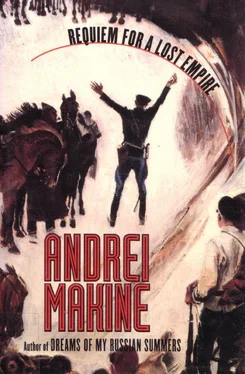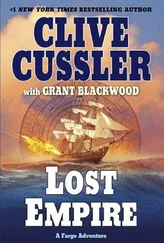The next day (after they had been hurled, as usual without artillery support, into the stone maze of a little Polish town), he observed Marelst yet again, while trying to comprehend it all. There were many wounded because of the bullets rebounding in the narrow streets. Pavel was carrying a soldier whose tunic was swollen with blood, like a strange wineskin. As he came around a corner in the street he caught sight of the figure of Marelst, he, too, with a human burden. For a moment they walked together in silence, both of them sunk in that torpor at the end of a battle, when, finding your body still alive, you resume possession of it, as of your thoughts of a few hours ago that now seem several years old. From time to time Marelst gave way at the knees and straightened himself up with an effort, as he adjusted the position of the wounded man on his back. The lenses of his glasses were spattered with mud; one of the broken earpieces had been replaced by a length of wire. Pavel stared at these glasses, this face, saying nothing, struck by the disproportion: the broad bruise on his chin, a banal bruise, just like one you might receive in a mere fist fight, a mere bruise left by a battle that had just killed so many men. There was a curious irony about this flick of the wrist, with which death seemed to hurl back a man whose hour had not yet come.
Marelst must have noticed this look, or had he guessed that his origins did not find favor? That evening, seated by their campfire, he spoke in that level, dull voice the men in penal companies used to probe the depths of their past lives in whispers, lives which, from one day of reprieve to the next, seemed more and more foreign to them, as if lived by someone else. Somewhere halfway through his story, anxious no doubt to avoid the tones of a confession, he stopped and announced with uncompromising irony, "As a matter of fact, I've decided not to die. So nothing I'm telling you is final. Life continues, as the hanged man said when he saw the first carrion crows arriving. No, you'll see. We'll come through. We'll drink our hundred grams in Berlin. A hundred grams, what am I saying? A barrel." Later, when recalling that story told at nightfall, Pavel could not quite pinpoint the moment at which this gleeful outburst had occurred. As he remembered them, Marelst's words had had a grave, intense rhythm, into which it would have been impossible to introduce the merest scrap of humor.
In this story there was Marelst's father, a young clockmaker in Vitebsk, who one day walked out of his shop and hurled a heavy clock onto the sidewalk, together with its mahogany case, then began to trample on the fragments of glass as he wept. They thought he was mad. In a certain sense he had become mad, on learning that the house of his brother, who lived in Moldavia, had been pillaged and that the looting had degenerated into killing and they were driving nails into the skulls of newborn babies. He felt as if he could hear the crunch of the metal points piercing these heads scarcely covered with hair and could see the children's wide-open eyes. This noise and this vision pursued him relentlessly, so that he could no longer hear the watches ticking or respond to the smiles of his nearest and dearest. What tortured him as well was knowing that for the most part the looters were workers with three days' hunger in their bellies, jealous of the down quilt possessed by his brother. He felt that he had the strength, born of desperation, to seize the terrestrial globe and shake all the evil out of it. He would soon need this strength at the time of arrests, during the years of secrecy, in exile. In the revolution he became the all-powerful governor in his native town, and was then called to Moscow by Lenin himself. The goal seemed to him clearer than ever: not a single person must be left in this country, in the whole world, whom hunger transformed into a killer. To this end, some people must be given food. And, among the others, a few must be killed. During the civil war he understood that more than just a few must be killed. A few thousand, he began by thinking. Then a few tens of thousands, a few million… At a certain moment he caught himself having forgotten why they were killing people. It was the day his secretary had laid on his desk a fresh bundle of denunciations: in one of them he found a form of words that reminded him of the convolutions of a snake: "Citizen N. must be arrested, as he is suspected of being a suspect." It suddenly seemed as if his secretary was waiting for his reaction through the half-open door. That same year he learned that one of his old comrades from the time of secrecy had committed suicide. He tried to think calmly. The choice was becoming limited: he should either follow this friend or forget, once and for all, why they were killing people. He had three children. The youngest, Marelst, was born the day tears had been seen in Stalin's eyes as he stood beside Lenin's coffin. "I have a family," Marelst's father argued with himself. "And besides, you can't make a revolution in kid gloves." A big apartment right opposite the Kremlin, a chauffeur-driven car, a new secretary, even younger and more amenable than the previous one-when she left his office straightening her skirt he experienced a long moment of pleasant torpor, which no questions could any longer disturb. When he learned of the famine organized in the Ukraine and the millions dead he told himself that what was needed, so as not to lose your reason, was to extend this torpor over the entire duration of days. Marelst was ten in that summer of 1934 when they went to the Crimea. The excitement of the long train journey with his parents, his brother, and his sister kept him awake. He saw what he should not have seen. In one station, in a night blinded by floodlights, a crowd of women and children being driven toward cattle cars by soldiers brandishing their rifle butts. "Who are those people?" asked Marelst from his bunk. "Kulaks and saboteurs," his father quickly replied and went down onto the platform to threaten the stationmaster, who had dared to hold up their train in this ideologically dubious situation. His mother put her hand over Marelst's eyes. And he experienced a complex pleasure, comparable to the taste of the cake they had eaten on his sister's birthday: the white cream that lingered on your palate, fine chocolate chips, tiny flakes of crystallized fruit. In the same way he relished both in his mouth and through all his other senses the calm of their compartment, moving gently as it slid along beside the platform, the delicious swaying of his bunk, the smell of the cold tea on the little shelf below the window and, above all, in a foretaste of happiness to come, the Crimean pebbles that you had to pour from one hand to the other, searching for the mysterious chalcedony his father had told him about. The existence of the kulaks, who were being loaded into those hideous cattle cars, only served to add spice to his contentment. He was just about to go to sleep with this taste of patisserie on his lips when suddenly it was as if an icy gust of wind whirled around in the darkness of their compartment. The child was gripped by fear, an irrational fear and an idea that passed his understanding: one day he would be punished for this sugary taste of happiness in his mouth, for his joy at knowing the others were being crammed into freight cars without windows. He would learn how to formulate this fear some years later. For the moment there was only the fleeting draft of cold air and the vision of a woman trying to protect her child in the cut and thrust of rifle butts. He understood this fear during the winter of 1938. In the space of two months his parents grew old and now only spoke in whispers, feeling their way from one word to the next. All conversations carefully avoided the secret, betrayed precisely by this effort not to mention it: the imminent arrest of his father, the disappearance of what it came to them so naturally to call their life, their family. His father succeeded in forestalling the nocturnal ring at their door. In the government building where he was the minister in charge the staircases soared up in a broad, majestic curve and the space between the handrails was at least a yard across. His father threw himself into it from the top story and the employees going up and down had time to see this body as it streaked past the floors and several times struck the ironwork of the banisters. Someone tried to catch the open panels of his jacket in flight but all he was left with was a rapid burning beneath his nails. Thanks to this death, his father did not become an "enemy of the people" and their family, although dislodged from the prestigious apartment building, was not deported. They went to live with friends in Leningrad. The memory of the night when he saw the cattle cars as a child-the memory of his happiness-came back to him every day, together with that burning under the fingernails, which he imagined thanks to the employee's description. But the first battles had wiped out both the memory of this shame and the need to exonerate himself. There were too many deaths, too many bodies sunk in the mud of the fields, too many regrets encroaching on one another: the day when an abandoned wounded man reached out to him with his bloodied hand and he didn't stop, the next day, when an officer, standing up to go into the attack a second before him, was mown down by a burst of gunfire and Marelst had to climb over him. Ah that remained of his former life was a notebook filled with poems from his youth. A notebook now being dismembered, page by page, and used for cigarette papers. At first he saw this as a brutal lesson from life, as it reduced these sheets of paper, with their labored and melancholy sonnets, to ashes. But very quickly the taste of the coarse tobacco that drove away the smell of blood and rotting flesh gave the notebook a new significance-the silence of soldiers after a battle, rolling a cigarette with part of a poem. From now on there seemed to him to be infinitely more truth in the calm of such moments than in anything that might have been said about life or death in those rhyming verses.
Читать дальше










